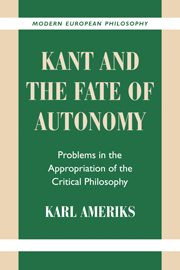1 - Kant's Modest System
Published online by Cambridge University Press: 05 June 2012
Summary
I want to have only a piece of the system of the whole of human cognitions, namely the science of the highest principles, and such a project is modest.
Metaphysik MrongoviusFrom a contemporary perspective, this remark, like Kant's Critical writings in general, can easily appear to suffer from a laughable fascination with systematicity, and to indicate an attitude that does serious injustice to both theoretical and practical realities by distorting issues in order to satisfy an obsession with formal principles. This common and harsh view of Kant has several understandable sources, no doubt, but I believe that a close look at the actual context of his work reveals that this kind of criticism distorts and covers over what are really the most distinctive features of the Critical philosophy. In contrast to most of his predecessors and successors, Kant's Critical work, as it was actually carried out, can be shown to be remarkably modest and sophisticated in its conception of the systematic nature of philosophy – even if it does betray a weakness for grand programmatic statements which led to unfortunate misunderstandings.
That there is a looseness in Kant's system is clear enough simply from the fact that the best-known philosophers who came after him, the German idealists, all immediately castigated Kant for not at all setting up the kind of absolutely certain and unified system that they believed philosophy clearly requires.
- Type
- Chapter
- Information
- Kant and the Fate of AutonomyProblems in the Appropriation of the Critical Philosophy, pp. 37 - 78Publisher: Cambridge University PressPrint publication year: 2000
- 1
- Cited by



